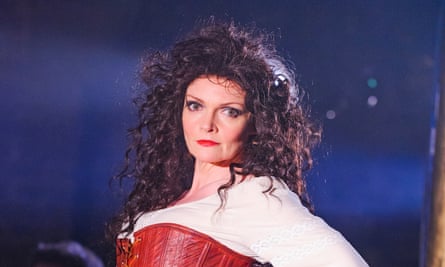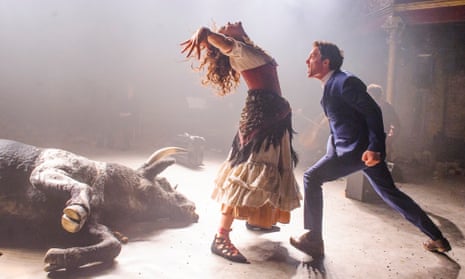To the Almeida, north London, where Carmen Disruption certainly lives up to its name. Even how you enter the theatre, crossing the rubble-strewn stage avoiding the bloody, quietly expiring bull, disrupts our normal expectations. From then on, this is 90 minutes that constantly plays on how the past might talk to the present in a productive, thrilling and daringly imaginative act of cultural vandalism. It is haunted and haunting, savage and beautiful.
The Almeida theatre began with the radical experiments, both theatrical and musical, of Pierre Audi in the 80s. So it’s appropriate that Carmen Disruption is playing here. Back in the day, you could catch early work from Complicite or Phelim McDermott or the premiere of Caryl Churchill’s Fen in an auditorium so cold you could see your own breath. It only subsequently morphed into a boutique purveyor of classy, starry stagings. Under Rupert Goold, it shows every sign of rediscovering its more radical roots, albeit with bigger budgets and better heating.
What Goold, and others elsewhere, notably Sean Holmes with Secret Theatre and David Lan at the Young Vic, are doing is questioning how we might tell the stories that feed us and fuel us, what a play – classic text or brand new – looks like and how theatre might work and organise itself in different ways to tell those stories. Carmen Disruption tells a story we already think we know well and shatters and reassembles it in surprising ways that make up us listen and look very hard. I suspect the upcoming Almeida Greeks season may do the same. I hope so.
Watching Carmen Disruption, it felt as if ghosts were rising – the ghosts of every performance ever played on this stage; the ghosts of an exhausted Europe; the way that sometimes we all feel like walking ghosts, and how, perversely, being online or in the theatre sometimes feels more real than real life. The opera singer at the heart of Carmen Disruption can no longer distinguish between herself and Bizet’s heroine who she has played in opera houses all over the world, in cities that are indistinguishable from each other.

If we want to keep these old stories alive, we have to tell them in new ways. That means making theatre in a new way, too, and sometimes shattering notions of what a play is and reimagining what it could be. For a piece that nails our fractured, disconnected lives and the loneliness that leaches our bones and puts its clammy fingers around our heart and crushes it, Carmen Disruption is clearly very much a collaboration.
Is it writer Simon Stephens’ Carmen Disruption any more than it is director Michael Longhurst’s or that of Lizzie Clachan, whose design echoes backwards and forwards through time to the great 19th-century European theatres that represented the height of a particular kind of culture and reminds us that we are but shadows, only briefly upon the stage? I don’t think so.
Or does it belong to the extraordinary, totally compelling cast – Sharon Small, Jack Farthing , Noma Dumezweni, John Light, Katie West and Viktoria Vizin? Or the striking lighting credited to Jack Knowles, Carolyn Dowling’s sound, Imogen Knight’s movement direction, or Simon Slater’s musical compositions that echo and shimmer with Bizet?

It belongs to all of them. Watching Carmen Disruption, I create my own personal version of it in my head. It belongs to me, too. Of course so can any show, and all theatre is but the sum of its parts. But, unless work is collectively devised, British theatre has always operated with a distinct pecking order in which the written word has primacy. I haven’t seen a script for Carmen Disruption; I don’t even know if there is one published. But, if there is, I’m pretty confident that what it represents is less a play – in the way that we might think of A Doll’s House or The Master Builder as plays – than an idea for a performance that must be collectively imagined by everyone involved, and that includes the audience.
At a time when theatre is at risk of being paralysed by fear of dwindling arts funding and there is a danger of trying to repeat the success of what has sold at the box office in the past, clinging to ways of working that have served for more than a hundred years, Carmen Disruption seems like a dare to British theatre and its many ghosts. Carmen Disruption acknowledges the ghosts, works with them but is never in thrall to them. That is as it should be. At the Almeida and everywhere else, too.

Comments (…)
Sign in or create your Guardian account to join the discussion